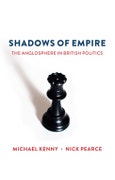The idea of an alliance between Britain and its old Commonwealth colonies has recently made a remarkable comeback in the context of Brexit. Based on belief in a special bond between the English-speaking peoples of the UK, the USA, Canada, Australia and New Zealand, it has been dubbed the 'Anglosphere' by supporters and 'Empire 2.0' by critics.
In this book, leading commentators Michael Kenny and Nick Pearce trace the historical origins of this idea back to the shadow cast by the British Empire in the late Victorian era. They show how leading British political figures, from Churchill to Thatcher, consistently reworked it and how it was revived by a group of right-wing politicians, historians and pamphleteers to support the case for Brexit. They argue that, while the contemporary idea of the Anglosphere as an alternative to European Union membership is seriously flawed, it nonetheless represents an enduring account of Britain’s role in the world that runs through the heart of political life over the last century.
Shadows of Empire will be essential reading for everyone interested in British politics and post-Brexit foreign policy.
In this book, leading commentators Michael Kenny and Nick Pearce trace the historical origins of this idea back to the shadow cast by the British Empire in the late Victorian era. They show how leading British political figures, from Churchill to Thatcher, consistently reworked it and how it was revived by a group of right-wing politicians, historians and pamphleteers to support the case for Brexit. They argue that, while the contemporary idea of the Anglosphere as an alternative to European Union membership is seriously flawed, it nonetheless represents an enduring account of Britain’s role in the world that runs through the heart of political life over the last century.
Shadows of Empire will be essential reading for everyone interested in British politics and post-Brexit foreign policy.
Table of Contents
- Contents
- Acknowledgements
- Introduction
- Chapter 1
- The Origins of the Anglosphere
- Chapter 2
- After Empire: The Rise of the “English-Speaking Peoples”
- Chapter 3
- A Parting of the Ways: Britain & the Commonwealth in the Post-War World
- Chapter 4
- The Powellite Interlude: Sovereignty, Decline and the Return to England
- Chapter 5
- The Anglosphere in the Late Twentieth Century: Retreat and Thatcherite Reinvention
- Chapter 6
- The Eurosceptic Anglosphere Emerges
- Chapter 7
- Brexit: the Anglosphere Triumphant?
- Conclusion








